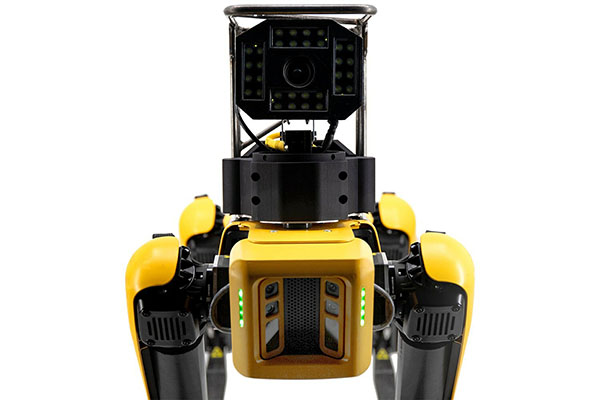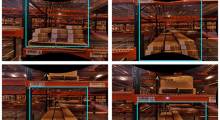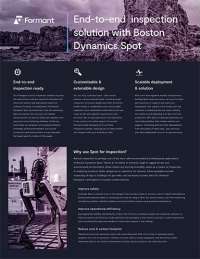RDI Technologies yesterday said it is offering its Iris Explorer as a payload for Boston Dynamics' Spot quadruped. Knoxville, Tenn.-based RDI said this will combine its vibration-analysis Motion Amplification technology with the autonomous mobile robot to enable high-volume, highly repeatable asset management.
“Our integration with Boston Dynamics creates significant opportunities to transform asset-heavy industries,” stated Jeff Hay, CEO of RDI Technologies. “Vibration analysis is a high-value part of every asset maintenance program.”
“In bringing together industry-leading vibration analysis and robotics in RDI's Iris Explorer Spot payload, we're providing critical tools to address challenging business problems – increasing safety and productivity while improving operations and assets in complex industrial environments,” he added. “We're already seeing customers gain more value from the unique pairing of Motion Amplification technology with Spot's agility and teleoperation capabilities.”
RDI provides sight beyond sight with Motion Amplification
RDI Technologies said its proprietary Motion Ampilfication system drives intelligent vibration equipment, data analytics, robotics, and services. The platform allows users “to see and measure motion previously impossible to visualize by contacting sensors,” it claimed. The company said this allows reliability and test-and-measure programs to make faster, safer, and more informed decisions.
With 200 years of industry experience, RDI Technologies said it helps clients in more than 60 countries and 40 industries gain greater speed to insight while reducing risk and cost. The company has more than 700 corporate and governmental customers including Google, Nissan, Duke Energy, Newmont, Amazon, Chevron, and the U.S. Navy.
RDI said Motion Amplification measures deflection, displacement, movement, and vibration not visible to the human eye. The technology turns every pixel in the camera's view into a sensor capable of measuring vibration or movement with high levels of accuracy, according to the company.
Motion Amplification provides instant visual imagery of hard-to-detect faults such as misalignment, bending, soft foot, and separation, along with trending capability of vibration readings for monitoring of chronic or emergent issues, said RDI.
Iris Explorer offers consistent condition monitoring
Active condition monitoring is time-consuming, meticulous work, noted RDI Technologies. If rushed or done improperly, data has little value, and entire routes must be redone, it said.
The Iris Explorer camera payload for Spot will allow industrial customers to take next-generation vibration analysis right to the asset, even in the most remote or hazardous environments, said RDI. Customers can use the robotic route-based vibration-analysis system to perform high-volume, highly repeatable autonomous route-based vibration analysis with reduced risk and increased efficiency, it said.
Industrial operations can benefit from Iris Explorer's Automated Feature Finding, which can repeatedly capture the same image data every time, across every route, for every asset, and in any environment, as often as needed, explained RDI.
Iris Explorer captures a full-field of view of an asset and allows for conditional, automated data triggers. Customers can then focus on the most relevant data, without the need to repeat routes, which is a common problem in asset maintenance, the company said.
Spot allows route-based operations to be automated and remotely monitored, said Boston Dynamics. Customers can apply the same observation protocols on the thousandth inspection as it was programmed to do on the first, without human bias, while controlling and performing routes remotely across plants, sites, or different regions, said RDI.
Iris Explorer is suitable for manufacturing; utility and power generation; mining; and chemical, biological, radiological, and nuclear customers that want to maintain peak performance of their assets while reducing risk and maintaining compliance, the company said. The payload allows users to cover more assets in a fraction of the time, providing more asset coverage while acquiring more diverse and consistent data at reduced human risk, it said.
Article topics
Email Sign Up



















